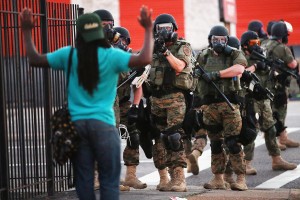
A sincere hope for change spread across Ferguson and all its surrounding communities.
Communities across the nation who have also been subjected to the same types of racial profiling, discriminatory practices and excessive use of force by police that plagued Ferguson hoped the state would now emerge as a leader in reformation.
As the legislative session came to a close Friday, however, it became obvious that things weren’t going to play out the way the Black community had hoped.
Lawmakers shot down dozens of proposed bills that were penned as direct responses to the chaos that erupted in Ferguson.
A wide variety of bills ranging from proposals to require all police to wear body cameras to rewriting the current laws surrounding when an officer has the right to use deadly force were all shut down or failed to make any meaningful progress as the House and Senate seemed divided on most of the issues.
“All told, more than 60 Ferguson-related measures were introduced this session,” The Associated Press reported. “Though a measure, propelled by concerns in Ferguson, passed limiting the powers and revenues of municipal courts, as did one rewriting the state’s student transfer laws that some said would aid families in the St. Louis suburb, some legislators said they had failed to pass anything meaningful in response to Brown’s death.”
For the residents and some lawmakers, it seemed like there would be no positive, lasting impact sparked from the unrest that brought Ferguson to its knees.
“We don’t have one piece of legislation that anyone here in this body can go home and say, hey, we did this for Ferguson,” Rep. Clem Smith told The Associated Press. “As it was this summer…it still is today. Nothing has changed.”
It’s a chilling thought.

According to House Speaker John Diehl, that was always the plan.
“We’re not going to have a ‘Ferguson agenda’ here in the House,” Diehl said at his opening day news conference back in January, according to the Chicago Tribune. “I think that the Senate has indicated that same thing.”
He went on to insist that the issues in Ferguson were caused by “decades of bad government policy” but were not the responsibilities of the actual police.
He recently resigned after the Kansas City Star discovered “sexually suggestive texts” between Diehl and a teenage intern.
Despite the lack of significant progress during this session, however, other prominent figures in the community are hopeful that change is still coming.
“Long-term policy change takes time,” said Denise Lieberman, a senior attorney for the civil rights group Advancement Project and co-chair of the Don’t Shoot Coalition, which was formed to address policy reform after Brown’s shooting, the Chicago Tribune reported.
Other pieces of legislation that were struck down included bills that would have developed standards for eyewitness identification, restricted police from racial profiling and required diversity and sensitivity training for all officers.


